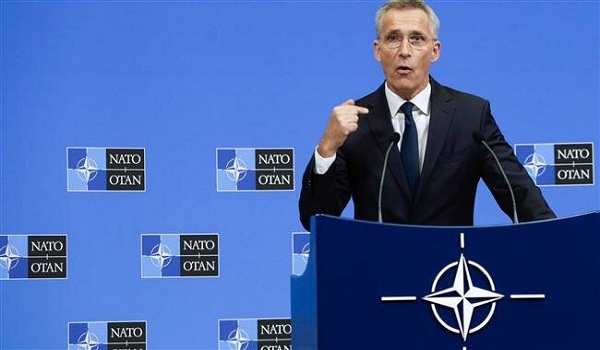NATO is considering options to upgrade its “air defenses” against Russian missiles after Washington withdrew from a key arms control treaty that will expire next month, European officials say, according to Press T.V.
The New York Times, which reported the news, cautioned that any change to the stated mission of NATO’s current missile defense system would probably divide the alliance’s member countries and enrage Russia.
Moscow maintains that the alliance’s missile defense sites in Eastern Europe are “a source of instability in Europe” and pose “a threat to its nuclear arsenal.”
Washington announced in February its decision to abandon the 31-year-old Cold War-era Intermediate-Range Nuclear Forces (INF) Treaty, alleging that Moscow had violated the pact for years.
Moscow reciprocated Washington withdrawal from the treaty by deciding to suspend the treaty.
On Wednesday, Russian President Vladimir Putin suspended the country’s participation in the INF over US violations of it.
The INF was signed toward the end of the Cold War, in 1987, by the then US President Ronald Reagan and Soviet leader Mikhail Gorbachev.
Under the treaty – which terminates on August 2 unless Moscow and Washington agree to revive it — both sides were banned from creating ground-launch nuclear missiles with ranges from 500 to 5,500 kilometers. The pact also banned the sides from deploying short and intermediate-range, land-based missiles in Europe.
While sources of the Times report cautioned that discussions among NATO members over new missile defense measures are at their earliest stages, the alliance’s chief spokeswoman, OanaLungescu, denied that any studies of the feasibility of upgrading the ballistic missile defenses were underway.
She was cited as emphasizing that the alliance had repeatedly made clear that the existing ballistic missile defense system “is neither designed nor directed against Russia.”
According to the daily, “American officials have focused on trying to deter Russian intermediate-range missiles by quickly developing their own ground-launched cruise missile, a class the INF treaty has banned.”
“Many in the alliance oppose deploying new offensive weapons. NATO planners are not expecting a directive to add offensive capabilities, only to expand defensive measures,” it added, quoting “a senior alliance official.”
This is while NATO’s Secretary General Jens Stoltenberg announced last week that the military alliance is considering new air and missile defenses without revealing any details.
The report further cited the allied official as adding that “given the rising threat of the Russian cruise missiles, NATO members are expected to order the alliance to study defense options, either after the October defense ministers’ meeting or the December leaders’ summit.”
However, it noted that such an order would require all 29 allies to agree to it, adding: “Some officials think that if the treaty ends, the allies will at least be willing to examine the options… If the allies ultimately could not agree on shifting the mission of the ballistic missile defense sites, they may be open to a compromise that would introduce new systems to defend against Russian cruise missiles.
The daily then pointed out that based on intelligence from multiple allied agencies, “NATO countries have forged a consensus that the new Russian nuclear-capable cruise missiles pose a threat.”
Any move by NATO to redirect its missile defenses or expand its system with new capabilities could be a tipping point, according to the report, noting: “Russians have never believed the alliance’s denials that itsinterceptor system would not eventually be used to shoot down Russian missiles. The system has remained a persistent irritant for Moscow, which questioned why the alliance still needed it after Iran agreed in 2015 to pause its nuclear enrichment program and threatened to direct missiles at the alliance interceptor sites.”
R.S

